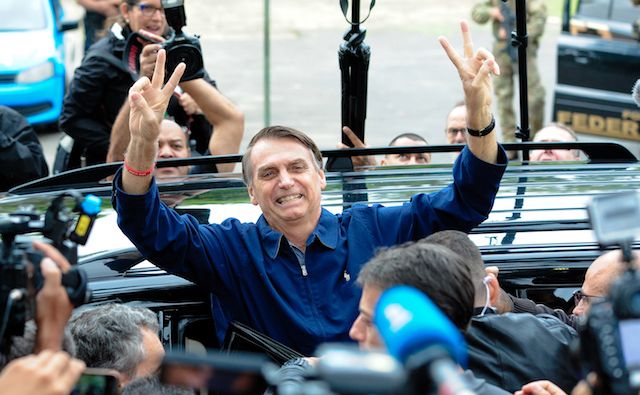Brazil’s presidential elections: An omen for Europe?
Europe is more developed and stable than Brazil, but its citizens also have strong reasons to feel let down by the mainstream political forces. An increasing number of voters here may, just like in the 2018 presidential elections in Brazil, support radicals in the hope of opening a path for badly needed reforms.

In a nutshell
- An outspoken leader of the small Social Liberal Party took a big lead in Brazil’s presidential race
- Jair Bolsonaro’s rhetoric is often not politically correct, but he accurately identifies what needs fixing in the country
- European voters have reasons to feel disappointed with their political elites too, and may turn to unorthodox solutions
Brazil, a country of more than 200 million inhabitants, suffers from insufficient economic progress, poverty that affects broad swaths of the population, high levels of crime and ingrained political corruption. It is a richly endowed and dynamic country, but it has been held back by wrongheaded policies and a culture of corruption in high places.
Particularly in recent years, scandals involving Petrobras, the state oil company, and Odebrecht, a construction company, revealed how deeply corruption had penetrated the nation’s government and political circles.
President Luiz Inacio Lula da Silva from the leftist Labor Party (Partido dos Trabalhadores, PT) ruled from 2003 to 2011. Although corruption increased on his watch and included him, Mr. da Silva, referred to simply as Lula, remains popular among the electorate – even as he now serves a prison term for corruption. This popularity seems to derive from his populist policies of giving the most impoverished citizens loads of government money – a tactic similar to that of Venezuelan President Hugo Chavez (1999-2013). Mr. Lula was succeeded in 2011 by his party colleague Dilma Rousseff. She was impeached five years later for corruption.
Undaunted, Mr. Lula tried to run for the presidency again this year – from his prison cell. It took Brazil’s Supreme Federal Court to block his candidacy.
Fixes needed
Jair Bolsonaro, from the small Social Liberal Party (Partido Social Liberal, or PSL) took a big lead in the race. Having received 46 percent of the vote in the October 7 elections – just short of the majority needed for an outright win – he is now the clear favorite in the runoff set for the end of October. He will face Fernando Haddad, the candidate of Lula’s PT, who received only 29 percent.
Mr. Bolsonaro is labeled a right-wing hardliner. Political correctness is definitely not his strong point, and some of his expressions can be described as offensive. At the same time, he is one of the few Brazilian politicians not stained by corruption allegations. And he precisely identifies the most significant problems faced by the country and proposes solutions.
Criminal violence is one such problem. Some 60,000 people are murdered every year in Brazil, but only one homicide case in 10 is ever solved. Mr. Bolsonaro promises to proceed ruthlessly against criminals: his recipe is to kill them. This approach copies President Rodrigo Duterte’s brutal war on crime in the Philippines but seems to sit well with a public yearning for safety.
Europeans also feel that existing political elites have failed them, being either unwilling or unable to deal effectively with the real problems.
On the economic side, Mr. Bolsonaro promises to privatize state-owned businesses to improve public finances, increase efficiency and eliminate the primary sources of corruption. He wants to restore more authority, especially spending power, to the states, at the expense of the federal government. Such a reform would indeed lead to better allocation of public funds while increasing accountability and efficiency. The candidate also stresses the need to reduce the number of cabinet posts, streamline the administration and simplify the country’s byzantine tax system.
Mr. Bolsonaro appears to be perceived by very many Brazilians as a real leader, someone who at long last will be able to implement the solutions the country needs.
Europe is differently structured than Brazil and has, in most places, lower levels of poverty, crime and corruption. But Europeans also feel that existing political elites have failed them, being either unwilling or unable to deal effectively with the real problems. Concerns over physical safety are increasing, while sluggish economies and overregulation, especially of the labor market, have resulted in alarmingly high unemployment in many countries, particularly among young people. Citizens also see the decline in the quality of public services, including the healthcare system, and worry about the financing of retirement benefits and education. As a result, a growing number of people in Europe feel left out.
As can be seen in many European elections, voters are turning to parties that promise to improve security by removing restraints on the police fighting thugs and organized crime. This trend also includes demands for changes in legal systems to mete out justice more effectively. These are legitimate demands, not going to the extremes of, for example, giving law enforcement a license to kill. If Europe’s security situation is allowed to deteriorate further, however, calls for more radical measures could regrettably become possible.
The police and courts should be able to act without fear of retribution from perpetrators of violent crime and theft. The institutions of law and order should not, however, constantly control the entire population, its communications and finances, as is repeatedly proposed in Europe.
The economic proposals of Brazil’s front-runner would no doubt make sense for Europe, too. Privatization, simplification and decentralization would be a good way to solve many European problems. Trying to fix them with a different recipe – centralization, harmonization, expanded public programs and more government – is bound to fail. And then we could witness the popular demand for strongmen rising in these parts.








